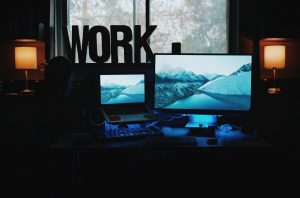
Beat That Blue Light Eye Peril
Should you be concerned about blue light eye peril? How long do you spend staring at a screen — computer, TV, tablet or phone — every day? According to the latest estimates, the average is 11 hours a day. And that’s given rise to a new scare about the effects of so-called blue light. As long as your eyes are being continuously bombarded with blue light, you may think it is necessary to take some action to protect them.
Blue light is a high-energy part of the full spectrum of visible light that humans can see. Moreover, it plays a positive role by increasing our attention to whatever we’re looking at. It can even enhance our mood.
But we all know that having too much of any kind of light hitting our eyeballs at night, especially just before we go to bed, can disrupt our sleep.
Eye Health
However, some research says that the blue light element causes a reaction in the retina, killing some cells that never grow back. Scientists say this could lead or contribute to an incurable eye disease known as macular degeneration. Around 2.5 percent of the population, mostly older folk, currently suffer from the disease, which can eventually lead to blindness. The worry is that the long-term use of electronic devices and even some types of light bulbs, could increase this figure and maybe begin to affect younger people. Meanwhile, there is no research that supports this effect from computer devices, alone. On the other hand, computer or digital eye strain does cause discomfort for many people. So let us look deeper into that issue.
Suggestions for reducing eye strain:
- Reduce the amount of continuous-time you spend on the screen. Take a break after 20 minutes and look at something about 20 feet away for 20 seconds.
- Adjust the light settings on your device. Apple and Android smartphones and current PC models and operating systems have filters or “night mode” settings that remove or reduce blue light.
- Wear eyeglasses instead of contact lenses
- Previously, it was suggested to wear filtering lenses. As reported by the AAO, there is no evidence that special glasses will help.
- Use artificial tear, lubricating drops for dry eyes
For more information and additional information about screen use from the American Academy of Ophthalmology, visit their article here.
Explore more insurance resources by contacting Smith-Kenyon Insurance Resources, LLC, today. Our agents can walk you through the various ways to protect your home and business.

